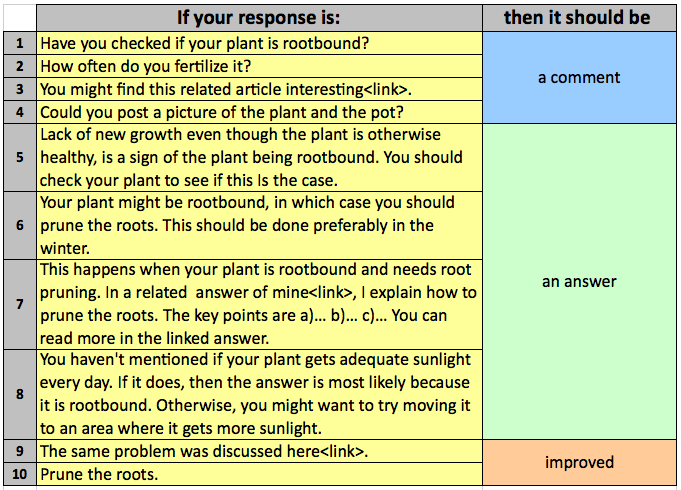The two can often be misleading and confusing, especially for those more familiar with traditional forums with sequential replies. I hope that the following examples will make it clear as to what should be posted as comment and what should be an answer. Consider the following sample question:
Why won't my plant X grow despite fertilizing it?
I have plant X growing in a pot and it was growing well. However, in the past few months, it hasn't grown much even though I water it regularly and fertilize it on schedule. What could have possibly gone wrong?
When should I post a comment and when should I post an answer?

Why should they be that way?
The first four responses are clearly asking for more information and don't answer the question. Although the first response has the correct idea for an answer, it stills fall short. This could be a preliminary comment for confirmation, while you compose your main answer.
The next four responses are what we'd like to see on this site. They are to the point, precise and informative. #5 and #6 are answers that complement each other (one has a well explained diagnosis and the other makes a crucial point: prune in winter). If they happened to both be in one answer, then great! If not, do not hesitate to edit your answer to include the information or at the very least, give a shout out and link to the other answer.
Response #7 references an earlier answer (could also be an external link), but provides a crucial summary so as to make the answer self sufficient. This is important for two reasons: having the summary helps in the case of link rot (i.e., external links are dead because their site shut down) and to not have to make people click through a whole bunch of links just to get to the answer. They can proceed if they like what they see. Remember, in all these cases, you should cite the source(s) that you quoted (it is a good practice to make it explicit that you're quoting yourself).
Response #8 is the sort of answer that has an answer in mind, but is unsure about one aspect that relies on missing information. It tries to answer the question, but at the same time asks for clarification on a different point. Typically, this plays out in the following manner: OP leaves a comment addressing the clarification sought in the answer and the answerer updates their answer accordingly. This works best when both the OP and answerer are prudent about responding and updating their respective posts and cleaning up the comment mess.
The last two responses are incomplete and show very little effort from the part of the answerer. True, it is tempting to just leave a link and walk off as in #9. However, remember that the answers that you're leaving are not just for the person who asked the question, but for practically anyone who visits that page. For the reasons I laid out above, such answers should be improved to bring it to a similar quality as #5-#8. If you're not willing do that, then it probably is a good idea to not post that link in the first place. #10, while technically the solution to the question, gives no indication or explanation as to why that is the solution.
Why was my answer converted to a comment and why was I encouraged to post my comment as an answer?
Often when your responses belong to #1-#4, they don't answer the question and the moderators move the answer to the comments, where they belong (till the OP responds/updates their question). At times, when the answer is good, but falls a little short of being a great answer, moderators might nudge you to improve on certain sections or provide a little more info on the topic.
Perhaps the most contentious of all, are responses #9 and #10. These are quite tricky as they do in fact answer the question, but not in the way that is considered a good answer. Moderators generally try to encourage users to expand on them or quote relevant parts. Beyond this, there is nothing much that can be done other than let the votes speak for itself. However, one exception is when the simple link response posted contains a link to another answer on the same site. In this case, it should almost always be a comment. This is to avoid people writing one mega answer and carrying it around to all similar questions and posting it for additional rep for no effort. Note that you can still structure the answer as #7 and that's perfectly fine!
Ok great! So when should I use chat?
If you need to have extended discussions with the OP in order to get things clarified or to work out a solution, then you should consider using the chat instead of a back-n-forth in the comments. This way you can talk to your heart's content and still leave the question clutter free. You can also collaboratively work on an answer before writing it up.
Chat is an informal environment where pretty much anything is allowed and the only moderation done is for spam and offensive content. You can discuss off-topic questions, alternate endings for the Star Wars trilogy or exchange pleasantries.
Hope this little guide helped clear some of the confusion that has been floating around on this topic.

